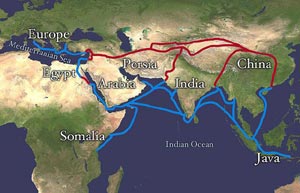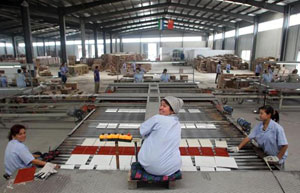DONGGUAN -- The first international expo for the 21st Century Maritime Silk Road closed Sunday with 174.7 billion yuan ($28.6 billion) in business deals signed.
 |
 |
According to the organizing committee of the expo, 80,000 businessmen, scholars and visitors from 42 countries and regions attended the three-day expo, including those from 25 countries along the 21st Century Maritime Silk Road.
Rosewood from Laos, shrimp chips from Indonesia, fruits from Thailand and decorations from India were among the commodities exhibited.
Last October, Chinese President Xi Jinping proposed the 21st Century Maritime Silk Road during his visit to Indonesia. The concept was written into the country's government work report this March.
"I know Chinese President Xi Jiping has said that China wants to rebuild this route. So I think this exhibition is part of that. We really like this idea," said Chamara Udugama, a tea dealer from Sri Lanka.
He said he decided to attend the expo after Chinese dealers e-mailed him orders after he distributed thousands of free tea samples at the China-South Asia Expo in Kunming, capital of southwest China's Yunnan Province, last June.
"If you give very high quality products, very high quality Ceylon tea, then the Chinese people are very knowledgeable. They will buy your tea," he said.
Former Malaysian Minister of Tourism Ng Yen Yen said the concept of a 21st Maritime Silk Road could help their country increase the number of tourists from 25 million to 60 million.
She advised involved countries to work together to help build a top-level cruise tourism industry in Asia, which would bring billions of US dollars in income and provide thousands of new jobs in Asia.
Cruise industry revenues in the Asian market reached $2 billion last year. The number could increase tenfold using the idea of a 21st Century Maritime Silk Road, she said.
Former chief economist of the World Bank Lin Yifu said countries along the 21st Century Maritime Silk Road were mostly regions with abundant natural resources, huge market potential, low labor cost and numerous tourism destinations.
Lin said that since 2008, when traditional industrialized countries in North America and the Europe encountered economic slowdown, new markets have been emerging in developing regions.
Long Yongtu, China's former chief negotiator for WTO entry, said China could strengthen the 21st Century Maritime Silk Road concept by shortening the expression to "MSR," and promote organized structure in the scheme.
"To build a regional development strategic mechanism, for example, we could form a cooperation committee of MSR before establishing a secretariat so that the concept would turn into a practice and keep running," he said.
